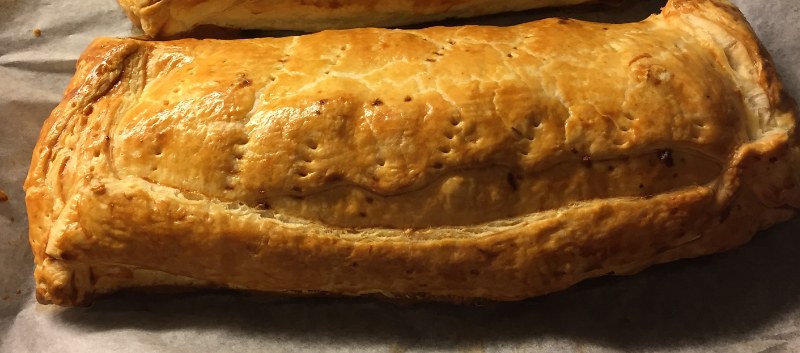Language evolves. The meaning of a word can shift over time as we use it differently — think of “cool,” “heavy,” or even “literally.”
Today, give a word an evolutionary push: give a common word a new meaning, explain it to us, and use it in the title of your post.
For the actual birth of the word “Fleisch Bruffeli” you must return to the year 1969, that memorable year when Mrs. Angloswiss and Mr. Swiss said “yes” in a registry office with two witnesses and the unforgettable Beda Baumgartner in is pin striped suit that was the marriage registrar at the time. No beating about the bush, it was a quick and painless step but a big one for the Angloswiss/Swiss family.
Of course we spent a time getting to know each other, which included food. One day I decided to make sausage rolls for the evening meal, a memory of England. Unfortunately english sausages were not available in Switzerland, but being and inventive type I created the next best thing.

and the fleisch bruffeli was born, although it was not as easy as it looks.
This is not an original fleisch bruffeli, it developed over the years into its constant form. The first attempt really did look like a smaller sausage roll, but as mentioned there were no small neat irish pork sausages available in the Swiss supermarket. I purchased mincemeat, and already the original taste was altered, because it was beef mincemeat. I was not keen on minced pork.
I fried the meat with onions, a crushed clove of garlic and spiced it up with what I found to be appropriate: some paprika for the hot taste, salt and pepper and anything that I happened to find in the cupboard and of course some red wine. There are no rules when your cooking gifts are to be adapted. I had a pack of pastry, just plain pastry, and cut it into stripes. I then placed the mince in a line on the stripes, folded the pastry after coating the edge with the white of an egg to make it stick together. The next process was to coat the pastry with the remainder of the egg, beaten together with the yolk to give it a nice brown shiny surface. It was then baked in the oven for 30-40 minutes and the first Angloswiss sausage rolls Swiss style were born.
Needless to say they were a successs. My food is almost always a success under the threat that I would refuse to cook again if it was not praised. At last there was something new on the table. My step children were also enthralled by this creation.
About a month later it was again time to cook something completely different. You cannot live on Rösti and Bratwurst every day and Mr. Swiss made the suggestion.
“Why don’t you make those fleisch bruffelis again. They were quite good.”
“Fleisch what?” I exclaimed, thinking this was a new Swiss German word I had not yet encountered.
“Fleisch bruffeli, you know that mincemeat in pastry”
and so the fleisch bruffeli was born in the Angloswiss household. Today I am writing about it, and for the first time in my 47 years of marital life I asked Mr. Swiss where the word “bruffeli” arose.
“No idea” was the answer. “just a moment, Uncle Otti and his family would use the word for broken teeth - a broffle” and so the word Fleisch Bruffle was born thanks to the imaginative Swiss German spoken by Uncle Otti who was the brother of my Swiss mother-in-law and so the word could often be heard in the Mr. Swiss family (she had many brothers and sisters).
Over the years the fleisch bruffeli appeared on the Angloswiss table in various forms, but today it is generally large a layer of pastry (which might even be the flaky sort) covered with the magical mincemeat mixture and completed with a final slice of pastry. It is much quicker and more convenient. After the cooking it is cut in family sized pieces. It may look different to a small roll of pastry with filling, but it tastes just the same. Over the last 47 years my cooking talent has developed.
Perhaps a less literal translation would be Swiss Pasty? :-)
ReplyDeleteFleisch is meat and the bruf is a broken tooth according to Uncle Otti's dialect. Actually it is an english sausage roll with mincemeat but in a different shape and size.
ReplyDelete